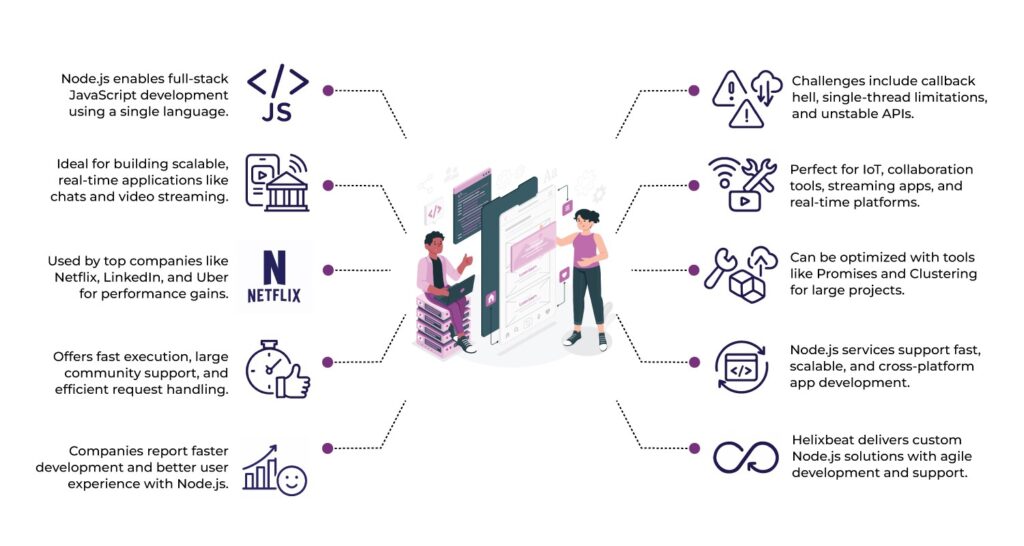So, what exactly is Node.js? It’s a platform that allows developers to run JavaScript on the server side, meaning you can use the same language for both the front and back end. Its ability to handle many connections at once makes it ideal for building apps that need to scale.
However, Node.js web development services can be a bit tricky. Its non-blocking nature can make it harder to manage tasks, especially for new developers. Still, developers choose Node.js because it’s fast and scalable, handling data efficiently.
For businesses, Node.js is a popular choice for building real-time apps, like chat systems, IoT platforms, or video streaming services. And its ability to handle many requests at once with little overhead is why both startups and big companies love it. With Node.js web development, businesses can create high-performing apps and easy to scale when they grow.
In this blog, you’ll learn more about Node.js web development, pros and cons and why you need to consider it for a wed development project.

Table of Contents
What is Node.js?
Node.js is a runtime environment that allow developers to execute JavaScript on the server side, rather than just within the browser. It uses Google’s fast V8 JavaScript engine, making it powerful for building efficient, real-time applications.
Node.js is perfect for apps that handle many simultaneous connections, like chat systems or video streaming services, without slowing down.
For instance, Netflix uses Node.js to manage thousands of simultaneous connections, ensuring smooth streaming experiences for users around the world. With Node.js, Netflix reduced the startup time for its web applications by 70%. This helps them quickly process data and deliver content with minimal delays, making Node.js an excellent choice for real-time applications.
Pros of Using Node.js for Web Development
One of the biggest reasons companies like LinkedIn and Netflix choose Node.js is its ability to handle thousands of simultaneous connections with minimal resource consumption.
Where, LinkedIn saw a 20x improvement in the performance of its Mobile App Development after switching to Node.js. On the other hand Netflix reduced its application startup time by 70%.
Easy to Understand and Use
Node.js is based on JavaScript, which is one of the most popular and widely used programming languages. This makes it easier for developers to get started, especially if they already have experience with JavaScript.
Walmart adopted Node.js, reducing its development time by 50%. It also attracted 80 million users in a month.
Full-Stack JavaScript
In Node.js web development, developers can use JavaScript for both the front-end and back-end of an application, creating a more streamlined development process. This unification simplifies collaboration and speeds up the development cycle, as developers don’t need to switch between different languages.
GoDaddy, for instance, uses Node.js for both their front-end and back-end, automating their workflow and improving efficiency
Top Performance
Node.js is built on Google’s V8 JavaScript engine, which compiles JavaScript directly into machine code, making it exceptionally fast. This performance is ideal for building applications that need to handle large volumes of data or user interactions in real-time, such as video streaming or online gaming platforms.
Largest and Active Community
The Node.js community is one of the largest and most active, offering countless resources, tutorials, and third-party modules. This active ecosystem helps developers quickly solve problems and access pre-built solutions, speeding up the development process.
Also, this large community helped PayPal reduce their response times by 35% when they transitioned to Node.js.
Tool Integration
Node.js works well with many tools and frameworks, which makes it easier to build complex applications. Trello, for example, integrated Node.js with MongoDB and Express.js to build a highly scalable and efficient real-time collaboration tool that now serves millions of users.
Powered by Google Chrome
Node.js uses Google’s V8 JavaScript engine, which improves speed and performance. This connection to Google Chrome ensures that Node.js stays optimized for handling large volumes of requests quickly.
Uber leveraged this engine to improve their real-time ride-tracking app, delivering faster and more accurate results for users.
Scalability
Node.js is designed for scalability, which makes it perfect for building applications that need to handle a high number of users or requests simultaneously.
With its event-driven, non-blocking architecture, Node.js can efficiently manage multiple connections at once, making it suitable for large-scale applications.
Caching Capabilities
Node.js can cache entire web pages or database queries, which helps to improve the performance of your application. By storing frequently accessed data in memory, Node.js can reduce the need to query the database repeatedly, speeding up response times.
Real-Time Request Handling
With its non-blocking I/O model, Node.js is built for handling real-time data efficiently. Uber uses Node.js to handle real-time ride requests, ensuring that users can get immediate feedback on ride availability. This fast request handling also improves user experience by reducing wait times.
Cons of Using Node.js
Despite its popularity with companies like Netflix and Uber, Node.js comes with some drawbacks. For example, Uber struggled with scaling their real-time features as their Node.js app grew, revealing some of the platform’s limitations.
Complex Asynchronous(non-blocking) Programming
The non-blocking nature of Node.js can make the code harder to manage, especially in large applications. It can lead to “callback hell,” where callbacks are nested too deeply, making the code complex and difficult to maintain.
Callback Overload
Node.js relies heavily on callbacks, which can quickly become overwhelming and hard to manage in large projects. Too many callbacks can make the codebase difficult to understand and maintain.
Less Support for Multi-Core Scaling
Node.js runs on a single thread, so it doesn’t natively support multi-core scaling. Although solutions like clustering exist, they can add complexity, as seen when LinkedIn faced performance issues due to this limitation.
Unstable API
Since Node.js is constantly growing, some APIs can be unstable, changing or even being removed over time. This can cause issues for long-term projects, as Netflix experienced when dealing with API changes.
Improper Robust Library Support
Not all Node.js libraries are well-maintained or reliable, which can lead to problems in development. Where PayPal faced similar issue when changing to Node.js, as some libraries lacked necessary features or had poor documentation.
Depends on External NPM Modules
Many Node.js web development services depend heavily on NPM modules, and while NPM provides an extensive range of libraries, the reliability of these modules varies. There is also the risk of security vulnerabilities in some third-party modules
Reasons to Consider Node.js for Web Development
Node.js web development comes with some great benefits that make it perfect for certain types of web development projects. If you’re thinking about building something that requires speed and scalability, then Node.js might be the right choice for your next app.
1. IoT-Based Applications
Node.js is a great choice for building Internet of Things (IoT) applications because it can efficiently handle numerous devices and sensors that send data in real-time. Its ability to manage many simultaneous connections with minimal resources makes it ideal for managing data from multiple devices without compromising performance.
2. Collaboration Tools
When developing collaboration tools like messaging apps or project management platforms, Node.js stands out. Its non-blocking, event-driven architecture allows for real-time communication, ensuring that users receive instant updates without delays. This makes it perfect for building tools where real-time interaction is key to functionality.
3. Video Streaming Apps
For video streaming applications, Node.js provides the performance needed to handle high traffic and real-time data streaming. Its fast data processing capabilities and ability to manage numerous simultaneous requests make it an ideal platform for building scalable and high-performance video streaming services.
4. Real-Time Applications
Node.js excels at handling real-time applications, such as online gaming, chat apps, and live notifications. Its non-blocking nature enables the smooth handling of numerous requests, ensuring that users experience instant updates and interactions. Whether it’s real-time communication or live data processing, Node.js provides the speed and scalability needed for such applications.
Node.js is a powerful tool, but it comes with some challenges, like dealing with complex code and limited support for multi-core processors. However, these problems can be solved using tools like Promises and the Cluster module. With the right approach, you can make the most of Node.js for your web development projects.
Build Your Web Application with Helixbeat
At Helixbeat, we create user-friendly web applications made just for you. Whether you’re in e-commerce, healthcare, or retail, we build features that align with how you work, not the other way around.
Here’s what you get with us:
- Custom-built solutions for your business needs
- Fast and efficient agile development process
- User-centric, intuitive designs for engagement
- Ongoing support and maintenance services
- Seamless deployment and execution management
Why Helixbeat?
From ideation to deployment, we manage every stage of web development to ensure seamless execution.
Our teams provide 24/7 support service for smooth development, quick issue resolution, and uninterrupted progress on your projects.
Contact Helixbeat today to bring your web application ideas to live. Let’s create scalable, powerful solutions that enhance your business growth.
FAQ:
1. Is NodeJS used for web development?
Yes, Node.js is commonly used for backend web development, especially for building scalable and high-performance applications.
2. Is NodeJS frontend or backend?
Node.js is used for backend development, enabling server-side JavaScript execution.
3. Can I use NodeJS to build a website?
Yes, Node.js can be used to build websites, particularly those requiring real-time data processing and dynamic content.
4. What is Node.js best used for?
Node.js is ideal for real-time applications, APIs, online gaming, and server-side applications that handle multiple requests.
5, What do you mean by Node.js web development services?
Node.js web development services involve building backend applications, APIs, and real-time data handling using Node.js.
6. What is Node.js vs React?
Node.js is a backend runtime environment, while React is a frontend library for building user interfaces. Both are used together for full-stack development.













